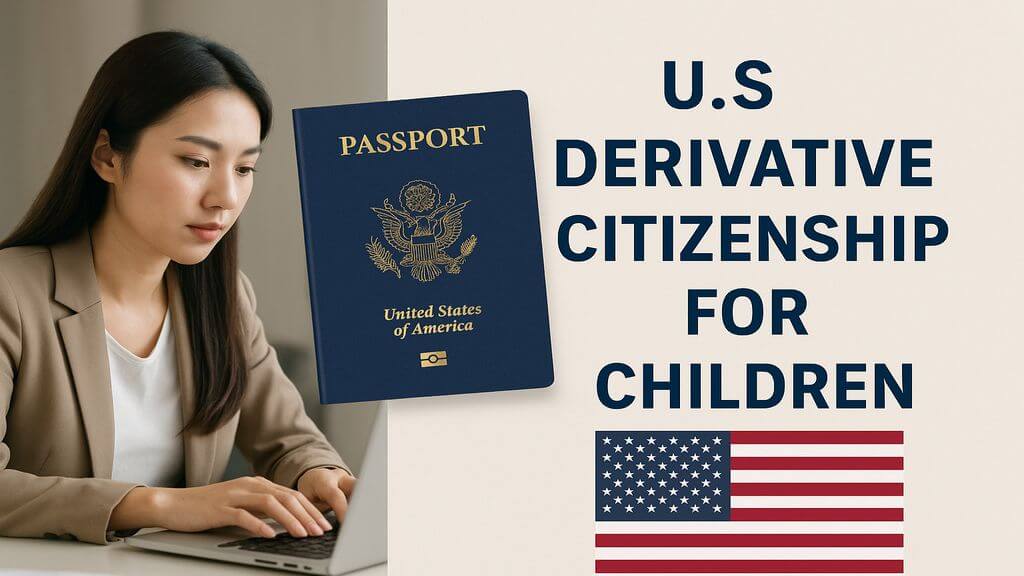Securing U.S. citizenship for your child is one of the most meaningful steps a parent can take. For children under 18, derivative citizenship offers an automatic path to lifelong rights, benefits, and opportunities ensuring they grow up recognized as full U.S. citizens.
While the process involves careful steps and documentation, the reward is invaluable: peace of mind and a future full of possibilities.
Who Qualifies for Derivative Citizenship?
Children under 18 automatically gain U.S. citizenship when all three of these conditions are met:
- The child is a lawful permanent resident (green card holder).
- At least one parent is a U.S. citizen, either by birth or naturalization.
- The child is living in the U.S. under the legal custody of the U.S. citizen parent.
Adopted Children and Stepchildren
- Adopted children of U.S. citizens can also derive citizenship.
- Stepchildren cannot derive citizenship from a stepparent.
Citizenship Documents:
Certificate of Citizenship
A Certificate of Citizenship from USCIS is official proof of derivative citizenship. It is typically granted to those who acquire citizenship through a parent’s naturalization. To obtain it, you file Form N-600.
U.S. Passport
A U.S. passport also proves citizenship. If a child has a Certificate of Citizenship, that document is sufficient.
If a Certificate of Citizenship is not available, you must provide additional documentation:
- Proof of Relationship to U.S. Citizen Parent:
- Birth certificate for biological children
- Adoption decree for adopted children
- Proof of Permanent Resident Status: Green card or other evidence of lawful residence under a U.S. citizen parent’s custody
- Proof of Age (Under 18): Birth certificate or official documentation
Children Born Abroad:
Children born outside the U.S. to at least one U.S. citizen parent may also acquire U.S. citizenship. This has separate requirements from derivative citizenship. For details on certifying a child’s citizenship when born abroad, refer to USCIS guidance or official forms.
Citizenship Laws for Children:
U.S. citizenship laws for children govern how minors acquire citizenship either at birth or through their parents. These laws are designed to ensure that children born abroad to U.S. citizens, or children adopted by U.S. citizens, can enjoy full citizenship rights.
Key Points:
- Children born in the U.S. automatically acquire citizenship under the 14th Amendment.
- Minors born abroad to U.S. citizen parents may acquire citizenship at birth under certain conditions.
- Citizenship can be acquired automatically or through a formal application process.
Check Also: U.S Dual Citizenship Law
Citizenship Requirements for Minors:
Citizenship requirements for minors focus on age, parentage, and residency. These requirements determine if a child qualifies for citizenship either automatically or through naturalization.
Eligibility Criteria:
- At least one parent must be a U.S. citizen.
- The child must be under 18 years old.
- The child may need to reside in the U.S. under the legal custody of the U.S. citizen parent.
- Compliance with relevant immigration and naturalization laws.
Automatic Citizenship for Minors:
Automatic citizenship for minors occurs in specific circumstances, such as:
- Children born in the U.S. are automatically citizens at birth.
- Children under 18, living in the U.S. with a parent who naturalizes, may automatically acquire citizenship.
- Certain adopted children may also receive automatic citizenship under the Child Citizenship Act.
Benefits:
- Immediate rights to a U.S. passport and Social Security number
- Eligibility for in-state tuition, healthcare benefits, and other government services
- Legal recognition as a U.S. citizen without additional procedures
Immigration Citizenship for Children:
U.S. immigration citizenship for children covers how minors can acquire citizenship through immigration processes. This includes children entering the U.S. on visas, green cards, or adoption.
Key Considerations:
- Immigration status affects eligibility for citizenship.
- Children in lawful permanent resident status may acquire citizenship if certain conditions are met.
- Parental citizenship and legal custody play a crucial role in the process.
Children’s Citizenship Through Parents:
Children’s citizenship through parents allows minors to gain U.S. citizenship based on their parent(s)’ status. This pathway is common for children born abroad to U.S. citizens or for children adopted by U.S. citizens.
How It Works:
- Citizenship can be transmitted automatically or via formal application.
- Parents must meet physical presence or residency requirements in the U.S.
- Proper documentation, including birth certificates and proof of parentage, is required.
How to Apply for U.S Derivative Citizenship for Children?
The child citizenship application process allows parents to secure U.S. citizenship for minors who are eligible but have not automatically acquired it. This is usually done through Form N-600, the Application for Certificate of Citizenship.
Steps in the Process:
- Verify eligibility based on parentage and residency.
- Complete and submit Form N-600 with required documents.
- Attend biometrics and possible interviews.
- Receive a Certificate of Citizenship confirming U.S. citizenship.
Conclusion:
Derivative citizenship allows eligible children under 18 to automatically acquire U.S. citizenship through their parents, including adopted children. Obtaining proof via a Certificate of Citizenship or U.S. passport ensures official recognition. Following the proper steps secures lifelong rights, benefits, and opportunities for your child’s future.
Frequently Asked Questions:
-
How long does it take to get a Certificate of Citizenship?
Processing times vary; it can take several months, so apply early.
-
What documents are needed to prove citizenship?
Certificate of Citizenship, birth certificate or adoption decree, green card, and proof the child is under 18.
-
What if my child turns 18 while I naturalize?
Derivative citizenship applies only while the child is under 18. Older children may need other immigration options.





